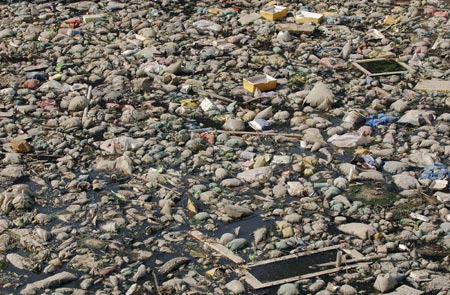UN: China faces pollution challenges
(AP)Updated: 2006-11-15 09:42
Beijing - The United Nations said Tuesday that China has made progress in increasing access to water for its citizens but still faces serious challenges in fighting pollution.
 Rubbish floats on a river crossing the city of Hefei, east China's Anhui province, November 9, 2006. [Xinhua]  |
Water pollution and a lack of clean drinking water are some of the most serious problems facing China, with many of its canals, rivers and lakes severely tainted by agricultural, industrial and household pollution.
"As the needs of consumers, agricultural and industrial production are pitted against one another in a booming economy, these problems can be expected to grow worse, not better," Tisot told a news conference.
Despite a growing recognition of the costs to the environment of China's industrial boom, heavy polluters continue to foul the water and air due to poor enforcement of restrictions at the local level.
But Tisot said China has yielded "impressive and laudable" results in extending access to water and improving sanitation across the country.
The government is building a US$60 billion network of canals to move vast amounts of water from China's wetter south to Beijing and other parts of the arid north.
Tisot spoke at a briefing on the UN's latest Human Development Report, which highlighted the Chinese government's measures to improve the lives of rural residents.
"Resources have been invested in developing and marketing sanitary latrines designed for rural areas," the report said.
Zhou Huaidong, director of the Ministry of Water Resources' water environment assessment center, said the government was aware of the urgent need to address the pollution problem.
"The severe pollution of water is a very severe setback for the socio-economic development of China," said Zhou, who was a panelist in a discussion at the conference. "Currently, out of more than 1,000 cities in China, 400 cities are faced with water shortages ... this is a very serious problem."
In August, the government said it would spend $125 billion to improve water treatment and recycling by 2010 to fight the mounting threat of urban water pollution.
| ||
|
||
|
||
|
|
